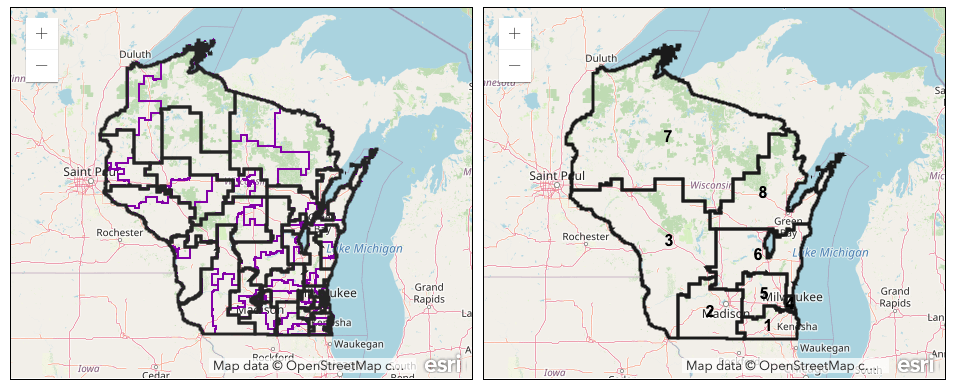
#image_title
#image_title
Gov. Evers: “Republicans will have to do better than this if they expect me to sign either of these bills—they need to go back to the drawing board.”
When Republican leaders in the state Legislature proclaimed that they wanted to make minimal changes to district maps to lock in their gerrymander, they meant it.
While leadership said they based the maps off of the People’s Maps Commission and input from the public, the proposed maps they released on Wednesday afternoon, are 84% consistent with the current Assembly map, 92% consistent with current Senate maps, and 93% consistent with current congressional maps, according to analysis from the state’s nonpartisan Legislative Reference Bureau.
The Campaign Legal Center (CLC), which filed a redistricting lawsuit on behalf of Black Leaders Organizing Communities (BLOC), a Black community organization in Milwaukee, its initial analysis of the proposed maps found that they would strengthen Republican control of Wisconsin’s congressional delegation, the Assembly, and the Senate. Based on past election data, Democrats and Republicans have a 48/52 overall vote share statewide. Republicans would have a 66% majority in the Assembly and a 70% majority in the Senate if the GOP-proposed maps were to somehow end up being the official new maps, giving the Republican-controlled Legislature a veto-proof majority for its proposed bills.
The maps have been introduced as Senate Bills 621 and 622 and have been sent to the Senate committee on Government Operations, Legal Review and Consumer Protection, which has scheduled a hearing for Oct. 28.
“Thanks to the tireless efforts of Wisconsin citizens advocating for open and honest government in Wisconsin, the redistricting process in our state this year is more transparent and people are paying attention,” said Sachin Chheda, director at the Fair Elections Project. “But they still retain the core of a map that a federal court ruled unconstitutional for disenfranchising Wisconsin voters, which is wrong and unacceptable.”
The Princeton Gerrymandering project also analyzed the People’s Maps Commission’s updated maps that were released on Wednesday and called the contrast between the Commission’s maps and Republicans’ “stark.”
The Peoples’ Maps Commission’s revised maps are based on feedback received on the initial drafts particularly regarding equal representation provisions in the Voting Rights Act. The commission is accepting feedback on the revised maps through Oct. 27 and can be submitted to the commission through its website.
Evers: ‘Go Back To The Drawing Board’
Gov. Tony Evers said he does not plan on signing the Legislature’s proposed maps unless serious changes are made.
“Republicans will have to do better than this if they expect me to sign either of these bills—they need to go back to the drawing board,” Evers said. “We’ve seen time after time how Republicans have tried abusing their power to cheat and pre-determine our elections, and they’re doing it again now. It’s unconscionable and insulting to the people of this state, frankly, that Republicans think they can pass another set of gerrymandered maps modeled after the same gerrymandered ones we’ve had for a decade.”
Mark Graber, Senior Director for Redistricting with CLC in Wisconsin, Democrats would have only carried two districts based on the 2020 election results if the recently proposed Republican maps had been used.
“It’s way out of step with how the state is as a whole,” Graber said. “This is one of the more extreme partisan gerrymanders that I’ve seen.”
And Congressional District 3 — currently represented by US Rep. Ron Kind (D- La Crosse) — would be made more Republican under GOP’s proposed map. In 2020, former President Trump carried the 3rd District, but the redrawn district would have widened Trump’s lead. Meanwhile the 2nd and 4th Congressional districts would be “just packed” with Democrats, according to Graber.
RELATED: GOP Approves Resolution That Tries to Lock in Gerrymandering for Another Decade
The data shows that Republicans used the same tactics in drafting state legislative districts.
“In these plans, the Democratic candidates would get really high margins in the few districts where they would have an opportunity to win,” Graber said. “The Republican candidates would get high margins in some, but would get margins of 55% as an example, in a host of other districts and so they would win them. They’d win them by a lower margin, but they would have the ability to spread out their wins in a way that would not happen for the Democrats, because they’re all super concentrated in fewer districts.”
Few Flippable Districts
Of the 33 Senate seats, only three could potentially change party more than once over the next decade: District 5, held by Sen. Dale Kooyenga (R-Brookfield); District 19, held by Sen. Roger Roth (R-Appleton); and District 32, held by Sen. Brad Pfaff (D-Onalaska).
Of the 99 Assembly seats, 19 could potentially flip more than once; seven are currently held by Republicans and ten are currently held by Democrats:
- District 4, Rep. David Steffen (R-Green Bay)
- District 13, Rep. Sara Rodriguez (D-Brookfield)
- District 21, Rep. Jessie Rodriguez (R-Oak Creek)
- District 33, Rep. Cory Horlacher (R-Mukwonago)
- District 45, Minority Caucus Chair Mark Spreitzer (D-Beloit)
- District 51, Rep. Todd Novack (R-Dodgeville)
- District 54, Minority leader Gordon Hintz (D-Oshkosh)
- District 55, Rep. Rachael Cabral-Guevara (R-Appleton)
- District 57, Rep. Lee Snodgrass (D-Appleton)
- District 64, Rep. Tip McGuire (D-Kenosha)
- District 65, Rep. Tod Ohnstad (D-Kenosha)
- District 71, Rep. Katrina Shankland (D-Steven Point)
- District 73, Rep. Nick Melroy (D-South Range)
- District 74, Minority Caucus Secretary Beth Meyers (D-Bayfield)
- District 81, Rep. Dave Considine (D-Baraboo)
- District 84, Rep. Mike Kuglitsch (R-New Berlin)
- District 85, Rep. Patrick Snyder (R-Schofield)
- District 90, Rep. Kristina Shelton (D-Green Bay)
- District 94, Rep. Steve Doyle (D-Onalaska)
The maps have been introduced as Senate Bills 621 and 622 and have been sent to the Senate committee on Government Operations, Legal Review and Consumer Protection, which has scheduled a hearing for them on Oct. 28.
Politics

Opinion: Many reasons why young adults should refuse to let Republicans kill the Affordable Care Act
In this op-ed, University of Wisconsin Medical School student, Samantha Crowley, shares the importance of young adults protecting the Affordable...

He said what? 10 things to know about RFK Jr.
The Kennedy family has long been considered “Democratic royalty.” But Robert F. Kennedy, Jr.—son of Robert F. Kennedy, who was assassinated while...
Local News

Stop and smell these native Wisconsin flowers this Earth Day
Spring has sprung — and here in Wisconsin, the signs are everywhere! From warmer weather and longer days to birds returning to your backyard trees....

Your guide to the 2024 Blue Ox Music Festival in Eau Claire
Eau Claire and art go hand in hand. The city is home to a multitude of sculptures, murals, and music events — including several annual showcases,...



